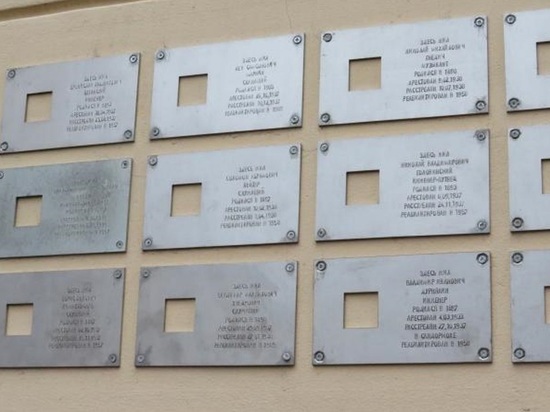Plaques with the names of the repressed residents have disappeared from the Dovlatovsky House at 23 Rubinshteina Street. The polished steel rectangles didn’t take up much space. It was just a memory of the past.
Sixteen plates within the framework of the Last Address campaign were installed on the wall of the house back in 2015. They were engraved with the names of ordinary townspeople – victims of the Great Terror of 1937-38. Then people were exterminated without any fault, according to the “lowered” plan (see the order of the NKVD of the USSR No. 00447, signed by the People’s Commissar Yezhov on the orders of Stalin). They were repressed both for alleged “subversive activities” or “anti-Soviet propaganda”, and simply on the basis of ethnicity. For example, among the sixteen victims of terror in the house on Rubinstein Street, there were a German, a Pole, a Latvian and a Greek (it is known that many execution lists of that time were called “Germans”, “Estonians” …). The plates also indicate the professions of the victims: an engineer, an employee, a musician, a naval sailor, an Astoria porter, and even an NKVD staff member. All of them (this is important) were posthumously rehabilitated.
The memory of past generations was short-lived. On October 14, the townspeople noticed that the plaques from the Dovlatov House were gone. It turned out that they were removed by the management company at the insistent demands of only three of the most “active” tenants. However, there were also other opponents of the Last Address in the house. Their comments are legally flawless.
“The house is a monument, so there must be an agreement with the KGIOP,” one of the residents said in an interview. And he continued in a completely Raikin style: “Personally, my position is: I am in favor of remembering terror, on the other hand, it must still be done within the framework of the law.”
To the delight of the activists, this “framework” turned out to be much closer in St. Petersburg than even in Moscow. Back in May 2018 (under the former governor), Smolny quite transparently decided on his attitude to the “Last Address”. Then in response to the appeal Alexandra Mokhnatkina (assistant to the State Duma deputy Vitalia Milonova) The Committee for Urban Planning and Architecture sent a request to the administrations of St. Petersburg districts “about the possibility of attributing cases of installation to administrative offenses.”
The officials’ formulations were distinguished by a subtlety rare for them. “The Committee respects the idea of preserving the memory of significant events in the history of the development of the state,” the KGA admitted, “however, the installation of memorial plaques is not the only form of perpetuating the memory of any event.” However, at the same time, the top federal leadership threatened to “deal with the situation,” and the question was hushed up just in case.
Perhaps that is why (despite the clear position of the officials), the plates were not always agreed upon, but they have never been removed. The current history is not formally connected with Smolny, but it may become a precedent.
It is interesting that the management company of the Dovlatovsky House itself tried to convey to the “Protestants” that the agreement was that the plates did not bother anyone and did not spoil the architectural appearance of the historical building. However, the civic activity of a certain part of society is growing stronger every year. In addition, for many years now, the Memorial Research Center (recognized as a foreign agent) has been located in the house at 23 Rubinshteina Street – the plaques with the names of the victims, in fact, were created on the basis of their archival information. Of course, this neighborhood worries some of the residents of the prestigious building.
The rest, as usual, preferred to remain silent.
“What happened on Rubinstein is not human, – said the St. Petersburg historian Lev Lurie… – As if the innocent were defamed a second time, posthumously. Complete moral deafness, pathological lack of empathy. “
It is known, however, that the tablets were not missing. They are kept by the management company. According to the engineer of the HCS Severo-Zapad (residents are used to calling him “the house manager”), after the completion of the cosmetic repairs, the management of the HCS will still try to solve the problem. It plans to talk to the disaffected at a general meeting and possibly return the plaques to the newly plastered wall.
There will be nothing strange and nothing new in this. The only thing that can be considered new is the dull indifference of the majority of the inhabitants of old houses in the center, which have suddenly become “elite”. Most likely, the fact is that the sad memory of the repressed tenants does not in any way increase the value of real estate, and some of the new owners only once again remind them of the unpleasant.
MK Help
The “Last Address” project (see the site poslednyadres.ru) is being implemented by the non-profit organization “The Last Address” Fund for the Perpetuation of the Memory of Victims of Political Repression “with targeted donations from citizens (they do not exceed 4000 rubles).
Newspaper headline:
The city doesn’t want to remember
